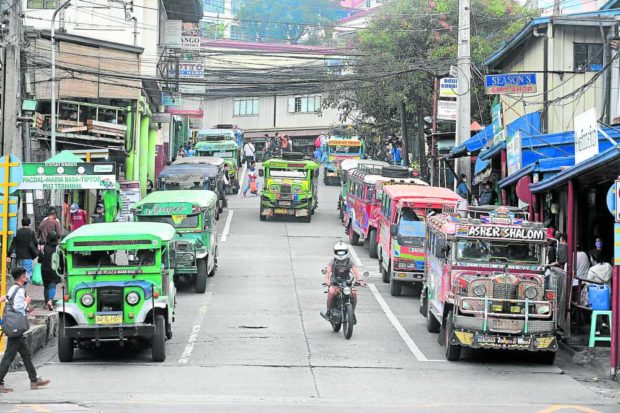LTFRB extends franchise of traditional jeepneys

BIG RELIEF | Operators and drivers of the original “King of the Road” can rest easy for now after getting a reprieve from the government. (INQUIRER FILE PHOTO)
MANILA, Philippines — The Land Transportation and Franchising Regulatory Board (LTFRB) has decided to extend the franchise validity of traditional passenger jeepneys, giving their operators and drivers more time to form cooperatives for the government’s public utility vehicle (PUV) modernization program.
The provisional authorization or franchise for traditional jeepneys was originally scheduled to expire by the end of March nationwide, except for Metro Manila, where these would be valid until the end of April.
The extension would allow thousands of jeepney drivers to continue plying their routes until the LTFRB could decide on a final deadline.
The agency has not specified the total number of targeted jeepneys but based on its assessment, only 60 percent have so far joined the PUV modernization program.
According to LTFRB Chair Teofilo Guadiz III, the board took into consideration the possibility of a transportation shortage should it implement the deadline.
Not indefinite
“We do not want to leave anybody [behind] so what we want is to have at least 95 percent on board if we continue this PUV modernization [program],” Guadiz told reporters.
The LTFRB, however, said that the extension was not indefinite as it was still deliberating on and finalizing the guidelines.
Guadiz also acknowledged that there had been some disagreement among jeepney drivers regarding the consolidation of their routes and cooperatives, adding that the board was looking into the possibility of allowing two to three cooperatives per route.
Another option, he said, was to extend the deadline so that they could comply with the regulations of the PUV modernization program.
“I instructed all regional directors to guide our jeepney drivers [about the ways on how to comply],” Guadiz said.
Earlier, a transport group urged the government to reevaluate the PUV modernization program after encountering problems in the deployment of electric jeepneys or e-jeepneys.
Ricardo Rebaño, president of the Federation of Jeepney Operators and Drivers Association of the Philippines, said that operators needed to pay a monthly amortization of P475,000 for operating 15 modern jeepneys despite their low daily earnings.
Struggling under system
“We tried to follow the government, the program, [but] this is what happened to us. We are really struggling with the system that is going on,” he lamented.
According to the LTFRB, the Public Utility Vehicle Modernization Program (PUVMP) was intended to make commuting and public transportation in the country safe, more efficient, climate-friendly, and environmentally sustainable.
Under the PUVMP that was launched in 2017, jeepney units 15 years old or more should be phased out and replaced by units with Euro 4 or electrically powered engines.
Aside from fleet modernization, other components of the program include route rationalization, local public transport route planning, and industry consolidation.